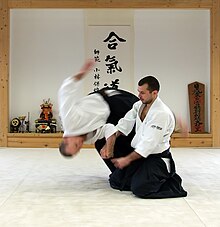Wikipedia:Wikipedia Signpost/2012-08-06/WikiProject report
Summer sports series: WikiProject Martial Arts
This week, we spent some time with WikiProject Martial Arts. Since April 2004, the project has been the hub for discussion and improvement of martial arts articles, including all disciplines and national origins. The project maintains a variety of conventions for handling the names and descriptions of Chinese, Japanese, Korean, Vietnamese, Indian, Sikh, Filipino, Okinawan, and hybrid martial arts. WikiProject Martial Arts has spawned or absorbed several subprojects focusing on boxing, kickboxing, sumo, and mixed martial arts. We interviewed 3family6 and Peter Rehse (PRehse).


What motivated you to join WikiProject Martial Arts? Do you specialize in a specific disciplines or styles of martial arts?
- 3family6: I joined because I am a martial artist. I hold a nidan in Shohei ryu karate, and have additional experience with mixed martial arts and a little bit of experience with Brazilian jiu-jitsu. I've also taken seminars in various other Eastern martial arts styles.
- Peter Rehse: My primary motivation was to improve the Aikido and related articles. At the time I had just set up my own group in Japan and kept on getting the question what is Aikido from students. It would have been easy just pointing them to the article but there was a lot of style bias at the time. From there I started working on articles for other martial arts I had been exposed to and then to martial arts in general. I have a strong interest in Japanese martial arts but also the historic interrelationship between that and other countries in the region.
Are the martial arts of some countries or regions better covered than others? Are there any noticeable gaps in Wikipedia's coverage of martial arts?
- Peter Rehse: Actually I think the covered is pretty even and reflects the actual traditions in the countries. There is a bit of me tooism where more is being made of than historically can be justified but that is improving.
How often does notability become an issue for martial artists techniques, competitions, and biographies? What are some easy steps to avoid these conflicts or to resolve them quickly?
- 3family6: I don't know how often it becomes an issue. I do know that there have been some very ugly RfD debates over specific MMA bout articles. I've seen campaigns by websites to contest deletion, and a sockpuppet investigation on some editors who posted mass RfDs. The best way to avoid these conflicts I think are to provided sources for an article on its creation. This can be tricky because a lot of martial arts training is verbal. With the MMA fights, I really don't know what to say other than that notability has to be proven for each individual bout. Certain bouts may have had a big impact on the style, but a reliable source needs to say so.
- Peter Rehse: Quite a bit and as said above it can be quite contentious especially with the more popular events like MMA. Generally though consensus seems to work with me wanting a long stick only a few times. The more annoying problem are the occasional vanity page which are often the only contribution of the author. It is probably not good practice but my rule of thumb is 'I am not notable but am more notable than...'. Of course I do the standard checks and the resulting discussions sort things out. Afd works well.
How does the project handle foreign terms and "loanwords" used in articles?
- Peter Rehse: There are good guidelines in place. It seems to work just fine.
Has the project tried collaborating with projects from foreign language versions of Wikipedia? Is there material that could easily be translated or shared between Wikipedia's various languages?
- Peter Rehse: This does not seem to be done often and usually results in a poorly written English page. Professional translators only translate into their native tongue - I wish that was the case for Wikipedia. Worse yet are non-english references but without those perhaps it would be too biased toward English speaking countries.
Have you contributed to the project's portal or any of the project's Featured Articles and Good Articles? How difficult is it to improve martial arts articles to FA or GA status?
- Peter Rehse: Yes - in several instances but it is hard. I wish I could say that all the comments attracted were useful and fixable but in many cases I could not be sure of the motivation. I rarely get involved now.
What are the project's most pressing needs? How can a new contributor help today?
- Peter Rehse: Some major martial arts are still heavily POV and badly written. New contributors should go to the art they know best and improve it. That is always a good place to start.
This concludes the Summer Sports Series. Next week's article will look at a project that helps resolve disputes and claims that there is no cabal. If you missed one of the seven sports projects we interviewed over the past two months, be sure to check them out in the archive.


Discuss this story
I started out on Wikipedia working in martial arts articles. One problem, I think, is the lack of reliable, non-self-published sources. Martial arts organizations don't seem to get much coverage in the media. Cla68 (talk) 00:44, 8 August 2012 (UTC)[reply]